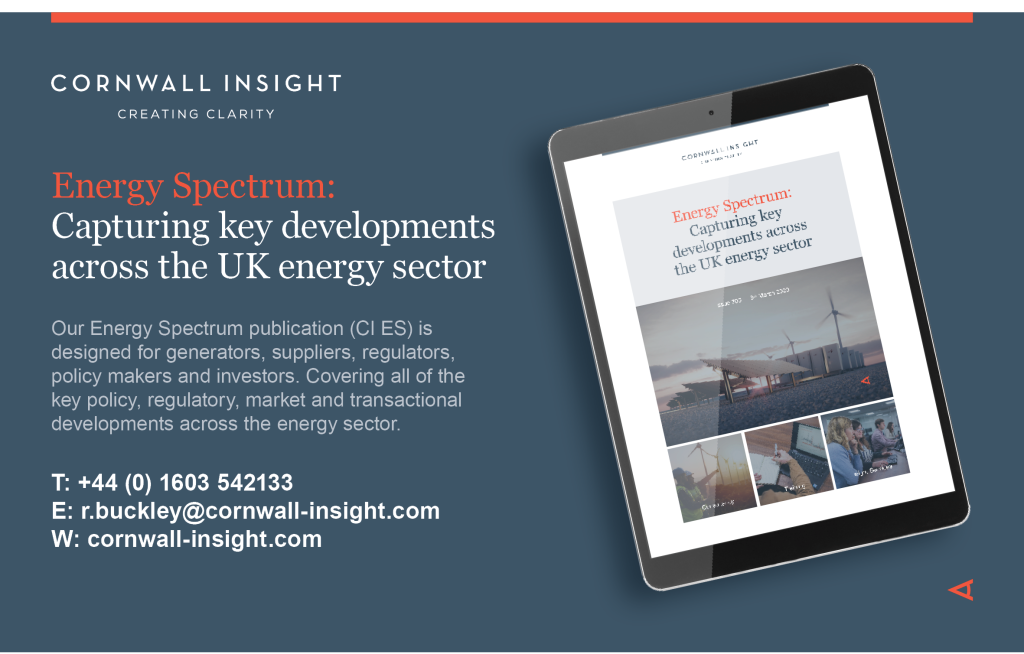This article is an extract from our Energy Spectrum publication issued on Monday 25 April. If you are interested in receiving critical policy, regulatory, market and transactional developments across the energy sector, and would like a free full sample of Energy Spectrum, please request a copy here.
You only need to look at examples such as Bulb, which owed £254mn in customer credit balances, to get an idea of the importance of credit balances as working capital for some supply business models. These proposals covered in our blog are therefore likely to have a monumental impact on the supply market, and Ofgem needs to be wary of potential unintended consequences such as reduced investor confidence and a loss of innovators from the market.
Full industry self insurance is not the right answer and will cost consumers money and displace funds that could be used for useful investments elsewhere in energy decarbonisation.
On 14 April, Ofgem published an open letter to domestic energy suppliers with an update to the December Action Plan on boosting financial resilience. The regulator plans to introduce measures to require suppliers to protect customer credit balances and Renewable Obligation (RO) payments.
In December 2021, the action plan to improve financial resilience was announced in response to the dramatic rise in global energy prices. Since then, Ofgem has taken several steps to build a more robust framework for the market to operate in, including the strengthening of licence entry checks and the creation of guidance to ensure that suppliers have sufficient control over their material assets. The latest update now calls for input from stakeholders on the regulator’s plans to protect customer credit balances and RO payments. Under the current market arrangements, suppliers can use credit balance and RO payments as free working capital, which Ofgem argues creates unsustainable growth and unstable business plans, ultimately resulting in an increased risk of supplier failure. Consequentially, the regulator is proposing a prohibition on using customer credit balances for this purpose and is also exploring licence conditions that would oblige suppliers to protect RO payments. Within the scope of protection for customer credit balances, Ofgem is also considering banning certain ‘payment in advance’ tariffs and strengthening requirements for more accurate direct debit billing. To ensure compliance with the prohibition, the regulator suggests holding the payments in insolvency-remote vehicles and a requirement to protect an amount equal to the gross credit balances net of unbilled consumption. This is intended to reflect the amount at risk of mutualisation. To apply the protections, the regulator has developed two potential approaches:
- Using a methodology to calculate the amount protected (preferred option): this would require suppliers to set aside a fixed amount based on a pre-determined methodology in an insolvency-remote vehicle. The calculation could be reviewed on a frequent basis and track the seasonality of credit balances, while the beneficiary of the protected amount would be either the customers or the Supplier of Last Resort (SoLR) on behalf of those customers. Ofgem has identified several insolvency remote protection mechanisms that could be used, alongside the advantages and disadvantages of each, including an Escrow account, a Trust account, a letter of credit, a 3rd party guarantee or surety, or a parent company guarantee. All options would need assessing under a set out criteria to establish how effective they would be for suppliers.
- Adopting a ‘client account’ approach with drawdown rules: this would require suppliers to collect and hold all existing and future payments from customers in an account held on trust, with drawdown only for specific purposes such as billing or reconciliation. Here the supplier would be the trustee, and where the supplier fails, the sums would be paid to the incoming supplier and ensure that the account value would be outside of the insolvent estate of the failed supplier, minimising customer credit balance mutualisation.
The regulator is considering a similar range of protections for the ringfencing of RO payments, as well as whether all payments should be protected from the beginning of the obligation period, or if there should be a sliding scale for the obligation to increase over time. Ofgem is requesting responses by 3 May 2022 and has also stated it is open to allowing a suitable transition period that aligns with any necessary reform to the price cap, to allow suppliers to adjust. A statutory consultation is expected later in Spring.


